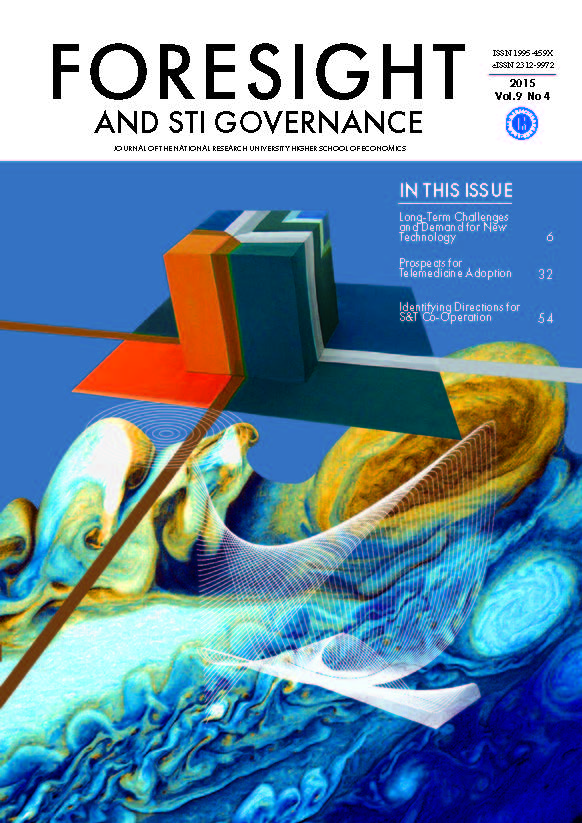Abstract
The primary long-term socio-economic challenges facing Russia – both global and country-specific in nature – drive demand for a range of technologies. We explore several groups of challenges, namely urbanization, demographic, socio-economic, the consequences of ageing, geopolitical, restricted access to key technological competences, climate change and its ecological consequences, as well as technological challenges largely associated with risks in ICT and biotech development, and the emergence of so-called ‘killer technologies’ that induce structural transformation in the economy.
We identify four groups of key factors influencing demand for new technology. First, those factors that strengthening Russia’s role as a provider of key natural resources for the global economy. Second, of equal importance are those factors that support import substitution of various products of the global market, including electronic components, chemicals, and food products. Third, developing centres of technological competences plays a significant role, especially in export-oriented, manufacturing, and services sectors. These include nuclear energy, software, weapons and military equipment, military aircraft, and energy machinery. Finally, technological advancement would occur by integrating Russia within global technological value chains with external system integrators in pharmaceuticals, machine-building, petroleum products, and some ICT sub-sectors.
References
Alemayehu B., Warner K. (2004) The Lifetime Distribution of Health Care Costs // Health Services Research. Vol. 39. № 3. Р. 627-642.
DHHS (2013) Paving the Way for Personalized Medicine: FDA’s Role in a New Era of Medical Product Development. Washington, D.C.: U.S. Department of Health and Human Services. Режим доступа: http://www.fda.gov/downloads/ScienceResearch/SpecialTopics/PersonalizedMedicine/UCM372421.pdf, дата обращения 04.05.2015.
DHHS (2014) 2020: A New Vision - A Future for Regenerative Medicine. Washington, D.C.: U.S. Department of Health and Human Services. Режим доступа: http://singularity-2045.org/HHS-regenerative-medicine-2020-vision-archive-2014.html#conclusion, дата обращения 04.05.2015.
Ernst & Young (2014) Куда движется технологический рынок: перспективы для России. М.: Ernst & Young, Форум "Открытые инновации". Режим доступа: http://www.forinnovations.ru/upload/doc/EY_Research_Open_Innovations_RU.pdf, дата обращения 07.02.2015.
Granger C. (1980) Forecasting in Business and Economics. New York: Academic Press.
Landeta J. (2006) Current validity of the Delphi method in social sciences // Technological Forecasting and Social Change. Vol. 73. № 5. P. 467-482.
Mendoza E., Quadrini V., Ríos-Rull J.-V. (2009) Financial Integration, Financial Development, and Global Imbalances // Journal of Political Economy. Vol. 117. № 3. Р. 371-416.
Molnar A. (2010) Economic forecasting. New York: Nova Science Publishers.
National Intelligence Council (2013) Global Trends 2030: Alternative Worlds. Washington, D.C.: Office of the Director of National Intelligence. Режим доступа: http://www.dni.gov/files/documents/GlobalTrends_2030.pdf, дата обращения 04.05.2015.
OECD (2013a) Working Better with Age. Режим доступа: http://www.oecd.org/els/emp/ageingandemploymentpolicies.htm, дата обращения 04.05.2015.
OECD (2013b) The changing landscape of innovation // OECD Science, Technology and Industry Scoreboard 2013: Innovation for Growth. Paris: OECD.
Peine A., Faulkner A., Jaeger B., Moors E. (2015) Science, technology and the ‘grand challenge' of ageing - Understanding the socio-material constitution of later life // Technological Forecasting and Social Change. Vol. 93. P. 1-9.
Popper R. (2008) Foresight methodology // The Handbook of Technology Foresight: Concepts and Practice / Ed. L. Georghiou. Cheltenham: Edward Elgar. P. 44-90.
UN (2012) World Population Prospects: The 2012 Revision 2012. Режим доступа: http://esa.un.org/wpp/, дата обращения 04.05.2015.
WEF, INSEAD (2014) The Global Information Technology Report 2014 / Eds. B. Bilbao-Osorio, S. Dutta, B. Lanvin. Geneva: World Economic Forum, INSEAD. Режим доступа: http://www3.weforum.org/docs/WEF_GlobalInformationTechnology_Report_2014.pdf, дата обращения 04.05.2015.
Абрамова Е.А., Апокин А.Ю., Белоусов Д.Р., Михайленко К.В., Пенухина Е.А., Фролов А.С. (2013) Будущее России: макроэкономические сценарии в глобальном контексте // Форсайт. Т. 7. № 2. С. 6-25.
Белоусов Д.Р., Апокин А.Ю., Сухарева И.О., Фролов А.С., Пестова А.А., Мамонов М.Е., Абрамова Е.А., Выдумкин П.А., Галимов Д.И., Михайленко К.В., Пенухина Е.А., Сабельникова Е.М., Сальников В.А., Фролов И.Э. (2012) Долгосрочное прогнозирование социально-экономического и научно-технологического развития России. Вып. 1: Методология. М.: МАКС Пресс.
Гидрометцентр России (2014) Риски и выгоды для Российской Федерации от глобального изменения климата. Режим доступа: http://meteoinfo.ru/news/1-2009-10-01-09-03-06/10150-24112014-, дата обращения 15.02.2015.
Гохберг Л.М. (ред.) (2014) Прогноз научно-технологического развития России: 2030. М.: Министерство образования и науки РФ, Национальный исследовательский университет «Высшая школа экономики».
Гохберг Л.М., Соколов А.В., Чулок А.А. (2014) Формирование перечня и характеристика ключевых глобальных и национальных вызовов и окон возможностей социально-экономического, научно-технологического и экологического характера на средне- и долгосрочную перспективу в интересах построения долгосрочных сценариев социально-экономического и научно-технологического развития российской экономики // Сценарный анализ влияния научно-технологического развития России на макроэкономическую ситуацию в долгосрочной перспективе (отчет ЦМАКП, шифр темы 2014-02-573-0003). М.: Центр макроэкономического анализа и краткосрочного прогнозирования.

This work is licensed under a Creative Commons Attribution 4.0 International License.

